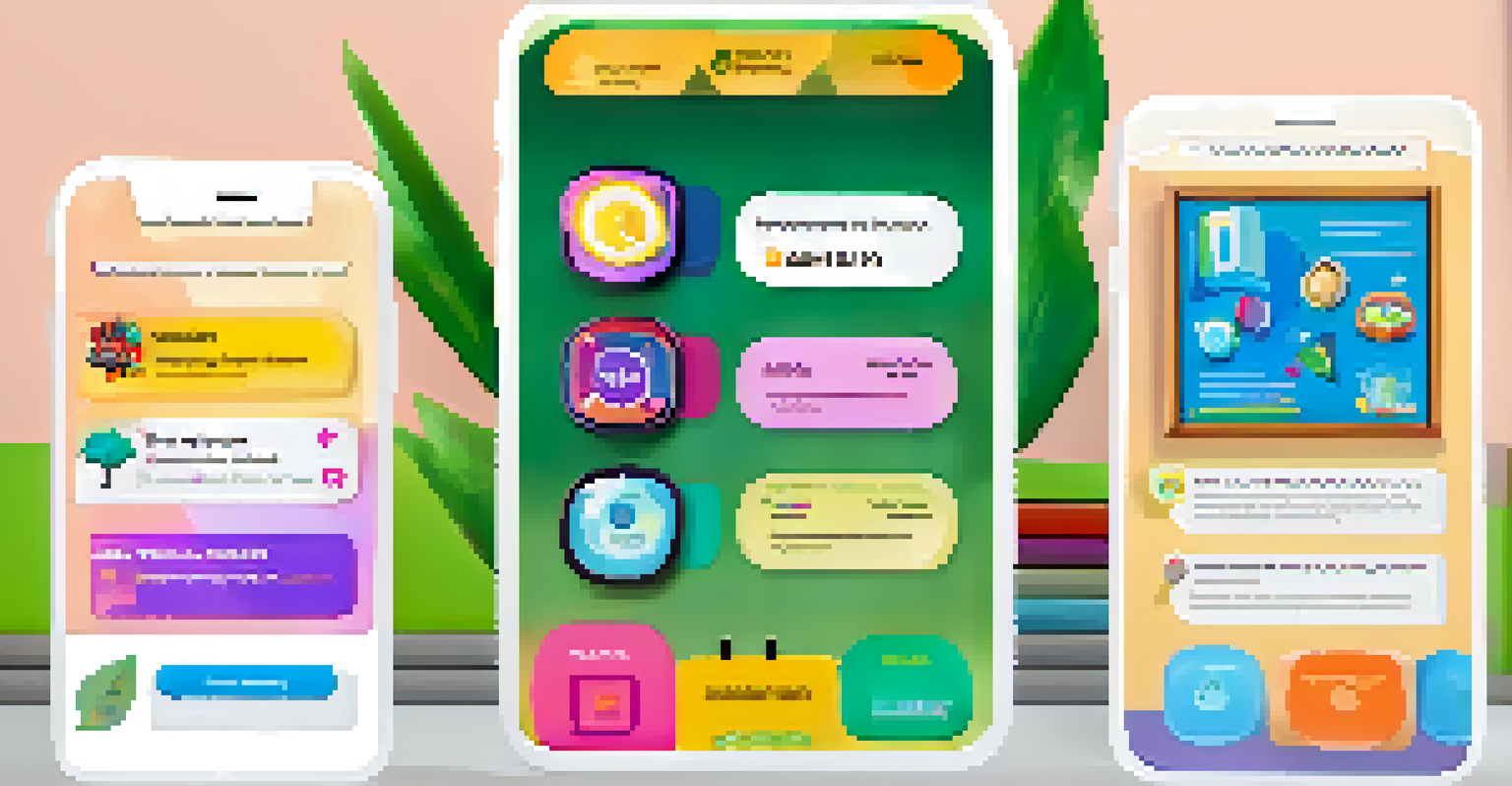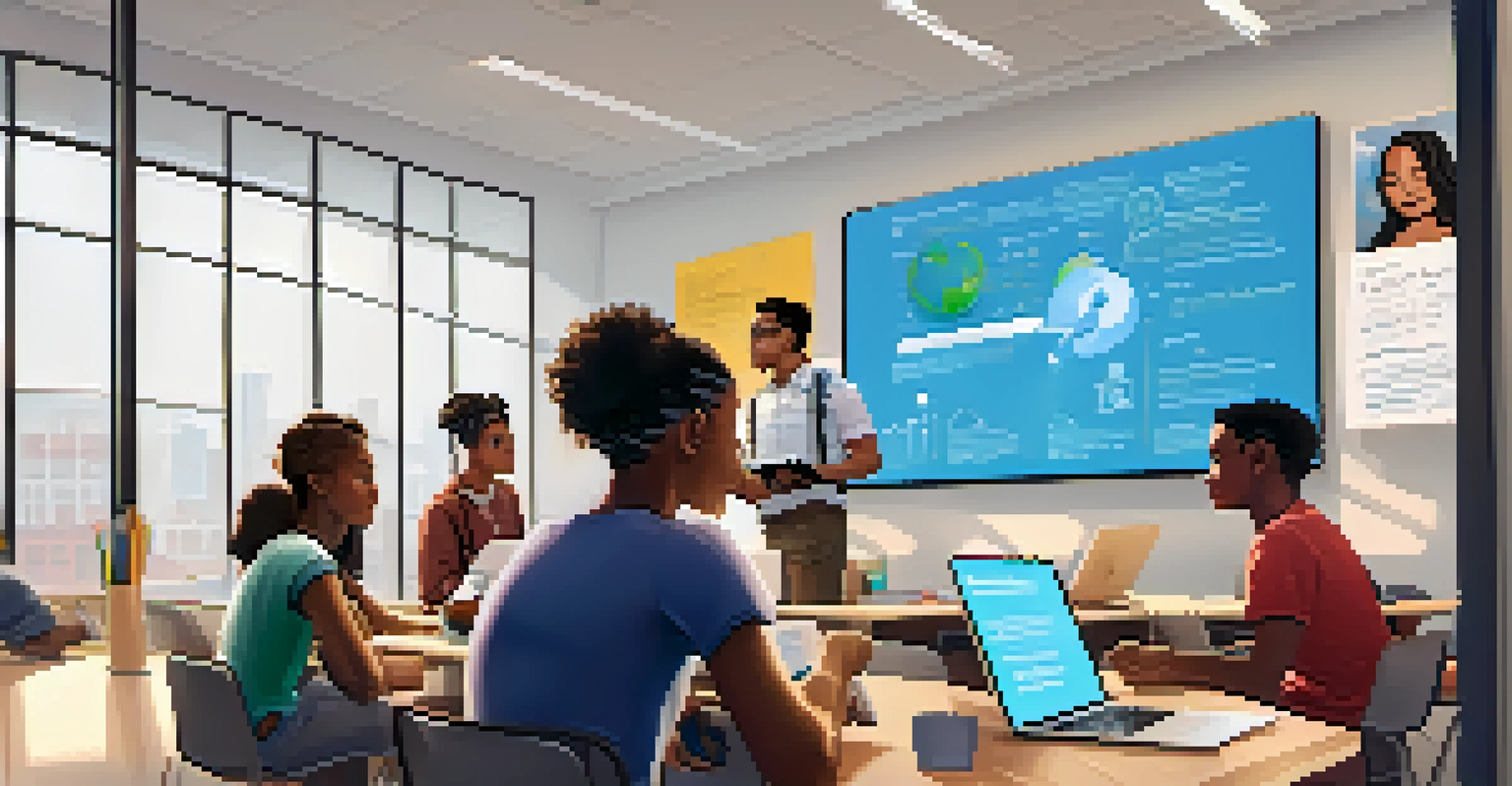The Influence of Mobile Learning on Student Motivation and Retention

Understanding Mobile Learning and Its Growing Popularity
Mobile learning, or m-learning, refers to educational experiences delivered through mobile devices like smartphones and tablets. This approach has gained traction in recent years, largely due to the increasing accessibility of technology. As students become more accustomed to using their devices for various tasks, learning on-the-go has become a natural extension of their daily routines.
The great thing about mobile learning is that learners can access materials at any time and from anywhere, allowing for a more flexible approach to education.
The convenience of m-learning allows students to access educational materials anytime and anywhere, which aligns with their busy lifestyles. Whether it's reviewing lecture notes during a commute or participating in online discussions at a coffee shop, mobile learning fits seamlessly into their lives. This flexibility is a key factor driving its popularity among students.
Moreover, the interactive nature of mobile apps and platforms enhances the learning experience. Features like quizzes, gamified elements, and instant feedback keep students engaged, making the learning process feel less like a chore and more like an enjoyable activity.
How Mobile Learning Enhances Student Motivation
One of the primary benefits of mobile learning is its potential to boost student motivation. When students can learn at their own pace and on their own terms, their intrinsic motivation often increases. This autonomy empowers students, making them feel more in control of their educational journey and encouraging them to take initiative.

Additionally, mobile learning often incorporates gamification—adding game-like elements to educational content. This approach makes learning fun and competitive, which can be particularly motivating for younger learners. The thrill of earning badges or competing on leaderboards can ignite a passion for learning that traditional methods may not evoke.
Mobile Learning Boosts Engagement
Mobile learning enhances student engagement by providing flexible access to educational materials anytime and anywhere.
Lastly, mobile learning fosters a sense of community through features like discussion boards and group chats. When students can easily connect with their peers and instructors, they feel more supported and engaged. This connection can significantly enhance their motivation to participate and succeed in their studies.
The Role of Personalization in Mobile Learning
Personalization is a game-changer in education, and mobile learning excels in this area. Through adaptive learning technologies, mobile platforms can tailor content to meet individual student needs. This means students can focus on areas where they need improvement while advancing quickly through topics they grasp easily.
Education must not only be about the transmission of knowledge but also about the engagement of learners through personalized and interactive experiences.
By offering personalized learning experiences, mobile learning keeps students engaged and motivated. When learners can see their progress and achievements, it reinforces their commitment to their studies. This tailored approach also caters to diverse learning styles, ensuring that every student can thrive.
Furthermore, personalized notifications and reminders via mobile apps can help students stay on track. Gentle nudges about assignments or upcoming quizzes can make a world of difference in retention rates, as students are less likely to forget important deadlines.
Mobile Learning and Its Impact on Student Retention
Retention is a critical aspect of education, and mobile learning has shown promising results in improving it. The convenience and accessibility of learning materials on mobile devices encourage students to engage more consistently with their coursework. This regular interaction fosters a deeper connection to the material, making it less likely for students to disengage.
Moreover, mobile learning facilitates continuous learning by allowing students to revisit materials whenever necessary. Whether they need to review a complex concept or prepare for an exam, having resources at their fingertips helps reinforce their understanding. This ongoing engagement is key to retaining knowledge and staying committed to their educational goals.
Personalization Drives Motivation
Tailored learning experiences in mobile education empower students and significantly increase their motivation to learn.
Additionally, the social features of mobile learning platforms can enhance retention by creating a sense of belonging. When students feel part of a community, they are more likely to stick with their studies—even when challenges arise. This support network is invaluable in keeping students motivated and focused.
Challenges of Mobile Learning and Student Engagement
While mobile learning offers numerous benefits, it also presents challenges that can impact student engagement. One significant issue is the potential for distractions from non-educational apps and notifications. With social media and entertainment just a tap away, maintaining focus can be difficult for students.
Additionally, not all students have equal access to mobile devices or reliable internet connections. This digital divide can lead to disparities in learning opportunities, ultimately affecting retention rates. Schools and educators must be mindful of these challenges and strive for inclusive solutions to ensure all students can benefit from mobile learning.
Finally, the effectiveness of mobile learning heavily depends on students' self-discipline and motivation. Without a structured environment, some learners may struggle to stay on track. Therefore, combining mobile learning with traditional methods could provide the balance needed to maintain engagement and ensure success.
Future Trends in Mobile Learning
As technology continues to evolve, so too will the landscape of mobile learning. Emerging trends like augmented reality (AR) and virtual reality (VR) are set to revolutionize the way students interact with educational content. These immersive experiences could enhance engagement and retention by providing real-world applications of theoretical concepts.
Furthermore, artificial intelligence (AI) is likely to play a significant role in personalizing learning experiences. AI-driven platforms can analyze student data to offer tailored suggestions and resources, ensuring that every learner receives the support they need to succeed. This level of customization can further boost motivation and retention.
Challenges Impact Learning Equity
Despite its benefits, mobile learning faces challenges like distractions and unequal access, which can affect student engagement and success.
Finally, the integration of mobile learning into formal education systems is expected to grow. As educators recognize the benefits of this approach, we can anticipate more hybrid models that blend traditional teaching with mobile technology. This evolution will ensure that students remain engaged and motivated in an ever-changing educational landscape.
Conclusion: Embracing Mobile Learning for Student Success
In summary, mobile learning has a profound influence on student motivation and retention. By providing flexible, personalized, and engaging learning experiences, it empowers students to take charge of their education. The convenience of mobile devices helps create a supportive environment that fosters connection and commitment.
However, it's essential for educators and institutions to address the challenges associated with mobile learning. By ensuring equitable access and developing strategies to minimize distractions, we can maximize the benefits of this innovative approach. Ultimately, embracing mobile learning can lead to greater student success and satisfaction.

As we look to the future, the integration of advanced technologies promises to enhance mobile learning even further. By staying ahead of these trends, educators can continue to engage and inspire students, ensuring they remain motivated and committed to their academic journeys.